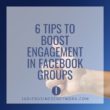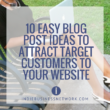Yesterday, while standing in line at a favorite coffee shop before my MasterMind meeting, a few FaceBook stars aligned to form the basis for this post, which shares three tips to help you make FaceBook more efficient and effective for your small business. First of all, if you don't have a personal FaceBook user profile, I strongly urge you to get one.
If you don't want a user profile, but want a business account (or Business Page), you can set one up at this link. There are reasons to establish both a Business Page and a user profile (and boy, did I resist doing this!), and I will discuss them in another segment of Indie Business TV. For now, I just want you to think about the big picture when it comes to leveraging FaceBook for your business. Doing these three things will help make that happen.
-
Establish your FaceBook user profile in your name. FaceBook is about people. It's also about business, but it's important to remember that Facebook's owner has arranged FaceBook specifically to help people connect with other people. This supports FaceBook's business model. It also explains why it's against FaceBook's Terms of Service to set up a user profile in the name of a business. That's what business accounts, or “Pages” are for. (Click here to learn how to set up a Business Page without having a user profile.)
Maintaining your user profile in your name allows you to connect with other people as the human being you are, and not as ABC Brand you own. People don't want to be friends with ABC Brand. They may “like” the brand, but they don't want to be friends with it.
When you introduce yourself at a networking meeting, you don't say, “Hi, I'm ABC Brand.” Instead, you say, “Hi, I'm Lisa Smith.” Then, if you get a chance to share your business, of course you do that.
Don't miss the opportunity to acknowledge and appreciate people as people before plugging your business.
(Take special note of the fact that FaceBook makes money because people have user profiles. FaceBook will therefore do everything it can to force you to create a user profile, and FaceBook will drive ads to it. Please remember that, and like I always say, don't rely too heavily on FaceBook (or any other third party owned digital tool) to promote your business. That is a mistake of epic proportions, especially in light of FaceBook's newly introduced “community pages,” which we are now discussing over at my FaceBook Page.
-
Establish authority on your Page. Your business Page is your branded piece of FaceBook real estate. You don't own it outright, but it represents your brand name, which of course speaks volumes about your credibility.
Protect and defend your brand online by not allowing others to post advertisements on your Page.
You must monitor your Page to make sure that doesn't happen. If you don't, your Page will degenerate into a spammy place, and no one wants to be in a spammy place.
At my social networking site, I shared a “firm, but make nice” email message I sent to someone who kept posting thinly veiled ads masquerading as comments on my Page. It was well received and seems to have made the point without creating an enemy. Feel free to use it as a model for your own.
- Share your FaceBook Business Page status updates automatically on Twitter. If you would like to simultaneously share information at your Business FaceBook Page and your Twitter page, push that information from FaceBook to Twitter by activating this application. You can deactivate at any time so you can cross-post selectively.
When you activate the app, and post an update to FaceBook, it automatically cross-posts to Twitter with a link back to the FaceBook Page where the conversation is taking place.
This is valuable because it allows your Twitter followers to see information that they might otherwise miss. They can see the Tweet, and they click the link to be taken to FaceBook where they can join the conversation about what you shared. That kind of interactive engagement does not happen efficiently on Twitter, making this an especially powerful way to increase community at your FaceBook Business Page.
A quick caution here: I do not recommend that you auto-post to Twitter and be otherwise anonymous there. Automation is good, but if you want to build a following on Twitter, you've got to make it your business to show up there in person regularly. Automate your sharing, but don't automate your interaction. Thank people who are your posts, ask questions, answer questions, share articles you like, etc. Use automation, but remember that you are a person, not a bot.
Question: What do you think of these tips? What additional tips or insights can you share with us?



